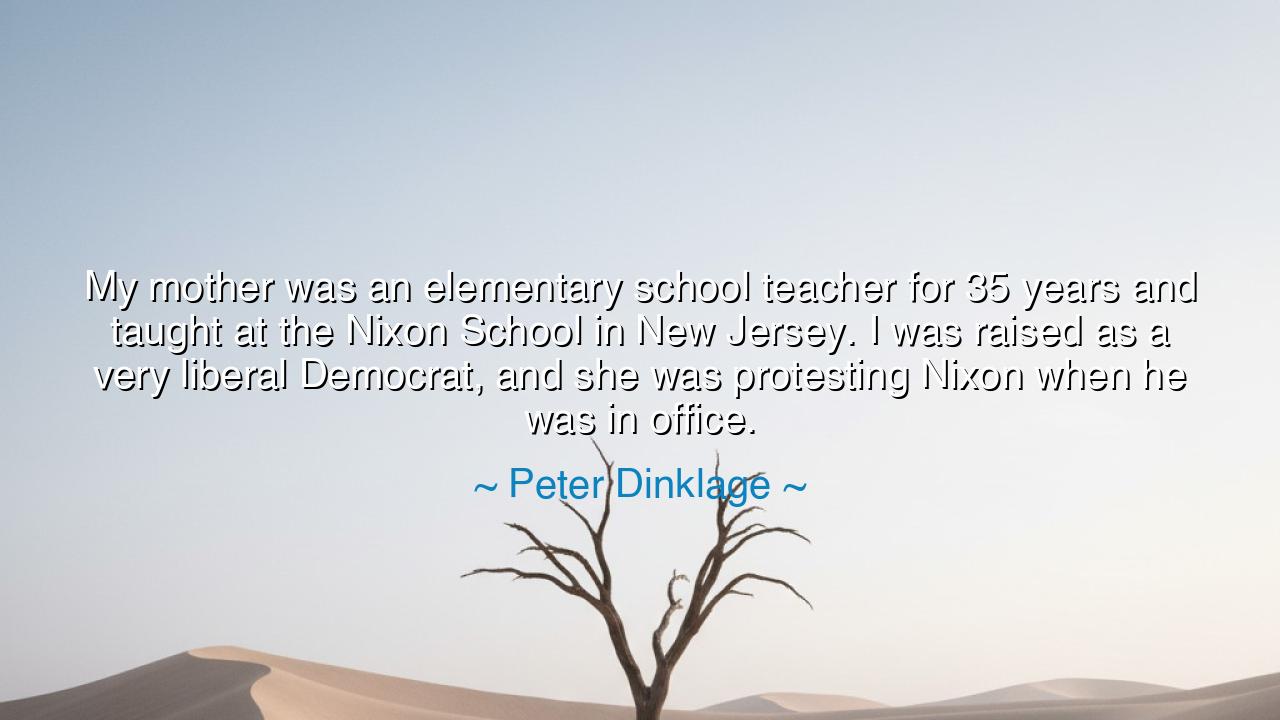
My mother was an elementary school teacher for 35 years and
My mother was an elementary school teacher for 35 years and taught at the Nixon School in New Jersey. I was raised as a very liberal Democrat, and she was protesting Nixon when he was in office.






Peter Dinklage, with both irony and reverence, once said: “My mother was an elementary school teacher for 35 years and taught at the Nixon School in New Jersey. I was raised as a very liberal Democrat, and she was protesting Nixon when he was in office.” Though spoken lightly, these words carry layers of meaning about family, conviction, and the strange poetry of fate. They remind us that the roots of a person’s character are often found in the quiet labor and fierce beliefs of their parents, who shape not only the mind but also the conscience of the child.
To call one’s mother an elementary school teacher is to honor the long and patient labor of shaping young lives. For thirty-five years she sowed seeds in the minds of children, teaching them letters and numbers, but also discipline, kindness, and curiosity. This vocation is no small thing; it is the silent work upon which society itself is built. And yet, beyond the classroom, she also stood as a woman of conviction—raising her voice in protest against the very president whose name adorned the school where she worked. In this tension we see both irony and courage, the ability to stand within a system yet resist its injustices.
O listener, reflect upon the strange twist of destiny: that a woman opposed to Nixon would nonetheless teach at a place bearing his name. Here is the reminder that we often must live within the symbols and institutions of power while still daring to dissent against them. To protest while laboring under the banner of one’s opponent is not hypocrisy—it is bravery. It shows that true belief is not silenced by circumstance but shines even brighter when tested by irony.
History offers us similar examples. Consider Galileo, who served under the authority of the Church yet questioned its interpretations of the heavens. He lived within an institution that bore the weight of tradition, but he spoke truth that contradicted it. Like Dinklage’s mother, he embodied the paradox of living under one banner while quietly, and sometimes boldly, defying its authority. Such tension is the mark of courage, for it requires endurance and strength to stand firm in conviction while surrounded by opposing symbols.
Dinklage also reveals the inheritance of such a spirit. Raised in a household of liberal conviction, he grew up not only with lessons of the classroom but also with lessons of the street, of protest, of moral resistance. This is the dual teaching of a mother who was both educator and activist: to sharpen the mind with knowledge and the heart with justice. Such an upbringing does not merely produce a student—it produces a citizen, awake to the struggles of the world, unafraid to speak truth against power.
The meaning of his words, then, is this: our parents are not only our caretakers but our first examples of courage. Their labor and their convictions become the silent inheritance of our souls. Even in irony—the teacher protesting the leader after whom her school was named—there is wisdom, showing that the human spirit cannot be bound by titles or symbols. True belief endures, and its power is strongest when passed from parent to child.
The lesson, children of tomorrow, is clear: honor the convictions of those who came before you, especially when they spoke truth in difficult times. Do not be afraid to live within systems while resisting their flaws. Take from your parents not only the comforts of home but also the fire of their ideals. And when irony comes, as it did to Dinklage’s mother, let it strengthen rather than weaken you.
For in the end, greatness is not only found in fame or power. It is found in the steadfast teacher, who for thirty-five years shaped young lives, and still found time to raise her voice against injustice. Her life reminds us that every act of teaching, every act of protest, every act of conviction plants seeds for generations to come. Such seeds grew in her son, and they may grow in you as well—if you choose to carry forward both wisdom and courage.






AAdministratorAdministrator
Welcome, honored guests. Please leave a comment, we will respond soon